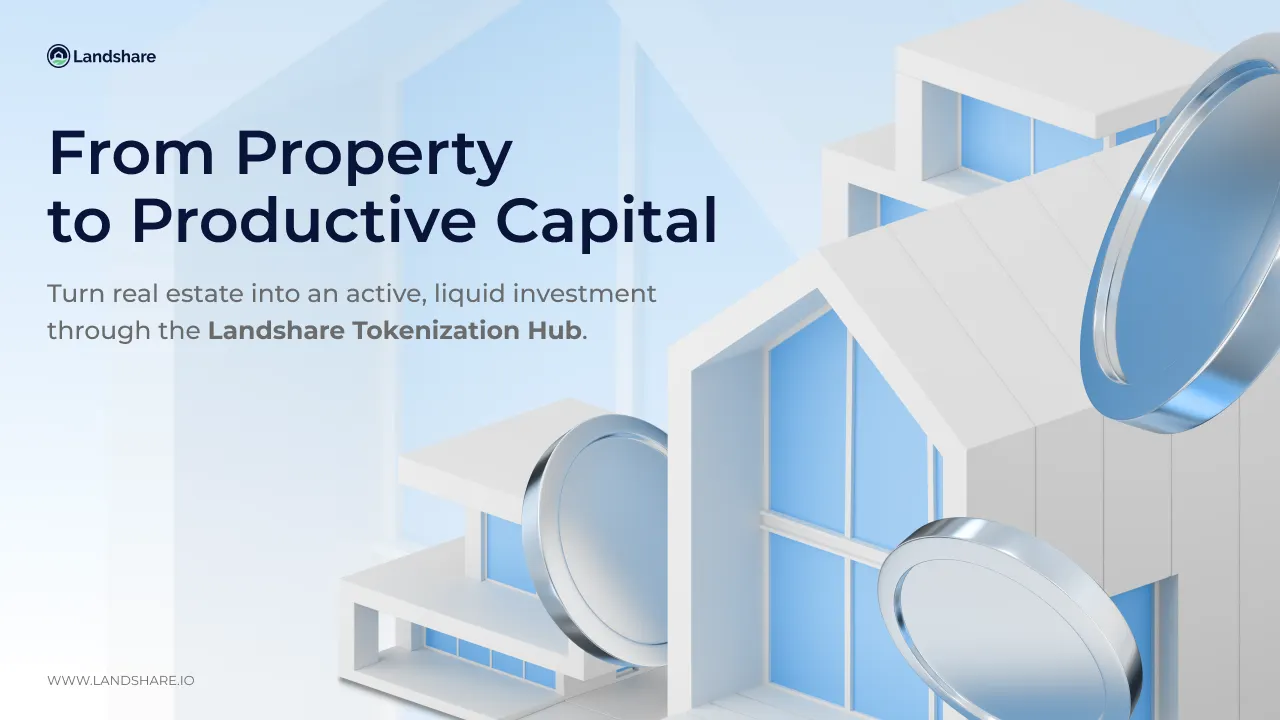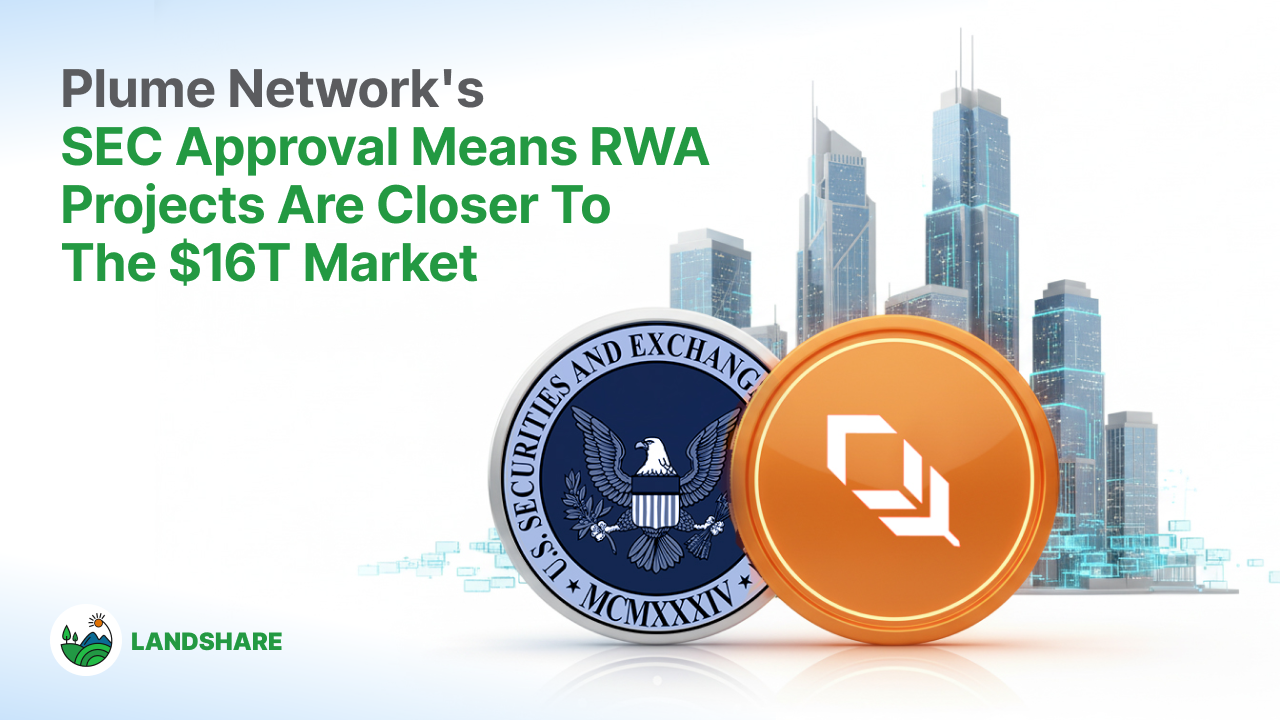7 Major Institutions That Have Embraced Tokenization
Landshare Team

As the world continues to transition into the digital age, financial institutions are seeking new ways to transform legacy infrastructure into modern, global, and digitally native systems. One of the most promising developments on this front is the use of tokenization.
Tokenization involves the representation of traditional assets such as real estate, art, and stocks as digital tokens on a blockchain network. Tokenization can bring about several benefits, including increased liquidity, fractional ownership, and increased accessibility to investors. It breaks down geographic barriers presented by existing financial systems and enables seamless global exchange of assets.
As time goes on, more and more banks, financial institutions, and even governments are exploring tokenization as a solution to real world problems. In this article, we will highlight seven major institutions who have embraced this emerging technology.
1. JP Morgan
JP Morgan is one of the largest financial institutions in the world with a market cap of over $398 billion. The bank has been actively exploring the use of blockchain technology for several years, and has developed its own blockchain network, Quorum.
JPMorgan called tokenization a “Killer App” for TradFi, and have launched a division dedicated to enabling institutional investment in tokenized assets. JPMorgan went on to collaborate with the Monetary Authority of Singapore (MAS) to launch a new pilot program, Project Guardian, to explore the exchange of tokenized assets on a public blockchain.

2. State Street
State Street is a leading financial services company that manages over $40 trillion in assets. State Street has been actively investing in blockchain technology and digital assets, and has launched several blockchain-based initiatives, including a platform for trading bonds using blockchain technology.
State Street has also established State Street Digital, a platform dedicated to the development of blockchain-based solutions. The platform provides institutional clients with tools for managing and trading digital assets, including cryptocurrencies and other tokenized assets. This demonstrates State Street’s commitment to exploring the potential of tokenization for enhancing financial transactions and their drive for innovation in the field.

3. Deutsche Bank
Deutsche Bank is a German-based investment bank with a market cap of over $20 billion. In 2020, Deutsche Bank began exploring asset tokenization, conducting a successful pilot project for the tokenization of €4 million ($4.9 million) worth of bonds.
Deutsche Bank doubled down in February 2023 by completing the proof-of-concept phase for Project DAMA, a platform designed to facilitate investment in tokenized securities.

4. BNY Mellon
BNY Mellon is a US-based investment bank with a market cap of over $46 billion. In 2020, BNY Mellon conducted a successful pilot project for the tokenization of a $25 million private equity fund. The project involved the use of blockchain technology to create digital tokens that represent ownership in the private equity fund.
In a 2022 survey of its clients, BNY Mellon found that a whopping 91% of large institutional asset managers, asset owners and hedge funds were interested in investing in some type of tokenized asset within the next few years. This demand led the BNY Mellon to become the first to launch a series of institutional-focused crypto services.

5. Goldman Sachs
Goldman Sachs is one of the most well-known investment banks globally, with a market capitalization of over $130 billion. The company has always been at the forefront of innovation, and this is no different when it comes to blockchain technology and digital assets.
Goldman Sachs has launched several initiatives to provide enterprise level investors with access to tokenized investment opportunities, including utilizing the technology to improve liquidity in illiquid markets. As a key player in the financial industry, Goldman Sach’s commitment to tokenization is likely to drive further adoption of tokenized securities by institutional-level investors.

6. PayPal
PayPal is a US-based payment processing company with a market cap of over $300 billion. The company has been actively exploring blockchain technology and its potential applications such as asset tokenization. In 2020, PayPal was granted a patent for a blockchain-based platform that allows for the tokenization of virtual assets.
The platform designed by PayPal is intended to facilitate the trading of virtual assets, including video game items, digital art, and loyalty points. These virtual assets are often stored in centralized databases and are difficult to transfer or trade. The tokenization of these assets on a blockchain-based platform would enable users to trade them with ease, potentially creating new markets for these assets.

7. Fidelity
Fidelity Investments is a leading financial services company with over $4.5 trillion in assets under management. The company has been actively exploring the use of blockchain technology and has been involved in several tokenization projects, including tokenized real estate, securities, and other real-world assets. Through tokenization, Fidelity aims to increase liquidity, reduce transaction costs, and create new investment opportunities for its clients.
In addition to its tokenization initiatives, Fidelity has launched a blockchain-based platform, Fidelity Digital Assets, which allows for the storage and trading of cryptocurrencies. The platform was created to meet the growing demand for institutional-grade cryptocurrency custody and trading services. With its significant investments and initiatives in the blockchain and cryptocurrency space already made, Fidelity is likely to expand its efforts in the growing trend of tokenization going forward.
Closing Thoughts
While these major institutions have varying degrees of involvement in tokenization, it is clear that they have recognized the potential benefits. As blockchain technology continues to mature and regulatory frameworks become clearer, it is likely that more institutions will follow suit and embrace tokenization as a way to streamline their operations and provide greater value to their customers.
Tokenization has the potential to transform the way that traditional financial institutions operate. By allowing assets to be digitized and traded on a blockchain network, tokenization can provide greater liquidity, transparency, and efficiency to the financial system. While tokenization is still in its early stages, these 7 major institutions have taken the first steps towards embracing tokenization and creating a clearer path for investors to access this emerging technology.
About Landshare: Invest in Tokenized Real Estate with as little as $50 directly on the blockchain through the Landshare platform. Landshare’s property offerings are carefully vetted and hand selected among thousands of potential options.
Find us on:
Twitter | Medium | Youtube | Telegram | Telegram Announcements | Coinmarketcap
Landshare October Recap
Landshare Team
October was a milestone month for Landshare – one that set the stage for the next era of on-chain real estate. From the official Landshare v2 announcement to new ecosystem updates, governance decisions, and exciting community initiatives, we’ve laid the groundwork for a future defined by growth, utility, and innovation.
This month, we introduced the framework that will redefine how investors, property owners, and DeFi users interact with real estate on-chain. Let’s recap the highlights 👇
Landshare v2 Announcement
The official unveiling of Landshare v2 signaled the start of a new chapter – one built around real utility, real yield, and real scalability.
Landshare v2 isn’t just an upgrade. It’s the foundation of a self-sustaining ecosystem where tokenized real estate finally reaches its full potential. The new system transforms stable assets into active yield-generating opportunities, seamlessly connecting traditional markets to DeFi.
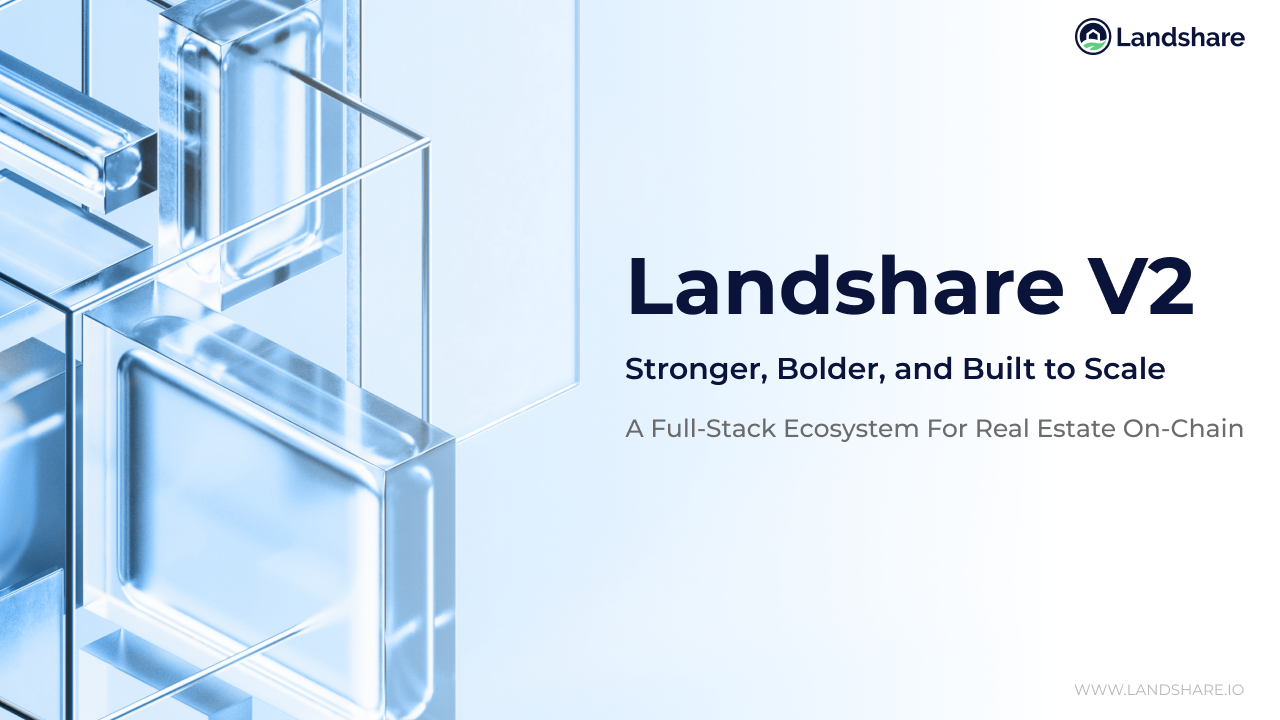
The Three Pillars of Landshare v2
In our follow-up deep dive, we explored the three core pillars that form the foundation of Landshare v2:
- The Real Asset Vault (RAV): A seamless gateway for stablecoin holders to earn real yield backed by tokenized properties.
- The Tokenization Hub: A complete solution for property owners to bring their assets on-chain.
- The DeFi Suite: Tools and incentives that amplify participation and utility across the ecosystem.
Together, these pillars create a self-sustaining growth loop, where every user and property strengthens the entire network.
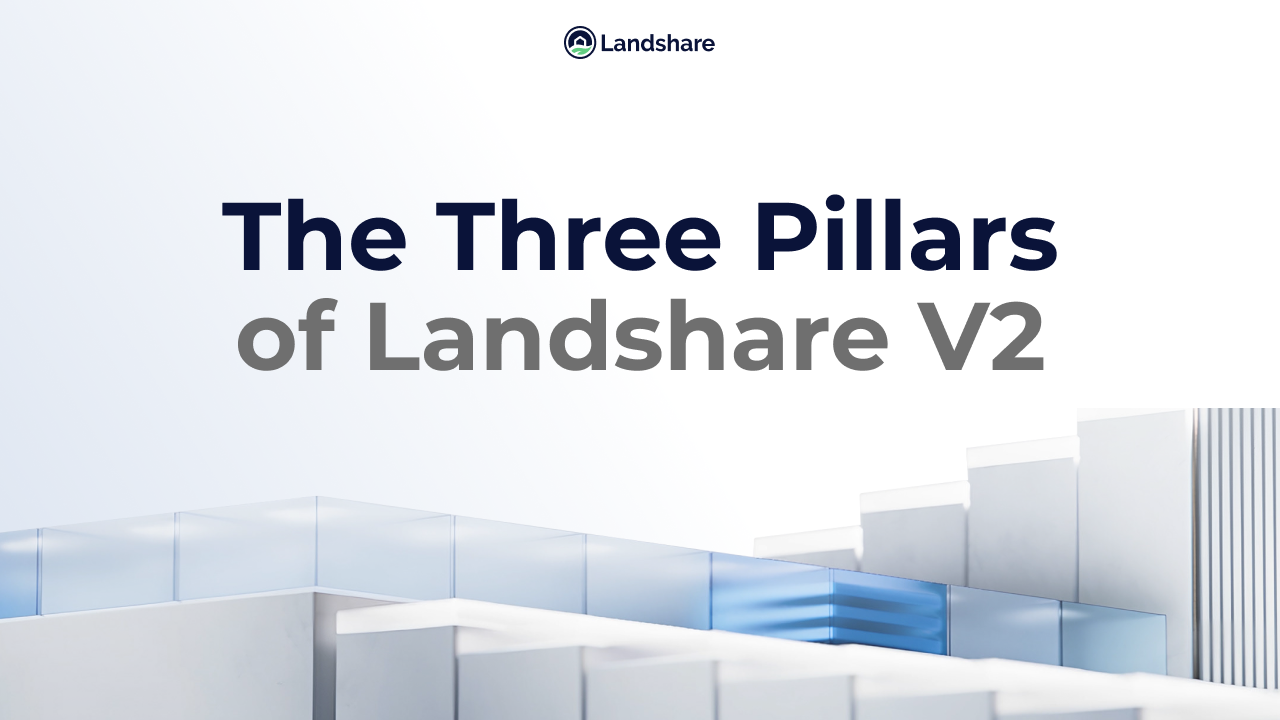
DAO Proposal Passed
In late October, the community voted to reduce LP emissions by 50% across both the LAND–BNB and LSRWA–USDT pools – with the proposal passing at 62.28% in favor.
This important step helps:
✅ Reduce daily LAND inflation
✅ Strengthen token scarcity and price stability
✅ Extend the reward pool lifespan
✅ Encourage long-term liquidity participation
The change will take effect within 48 hours of approval and marks another move toward a more balanced, sustainable economy for Landshare v2.
🗳️ View the full proposal and results
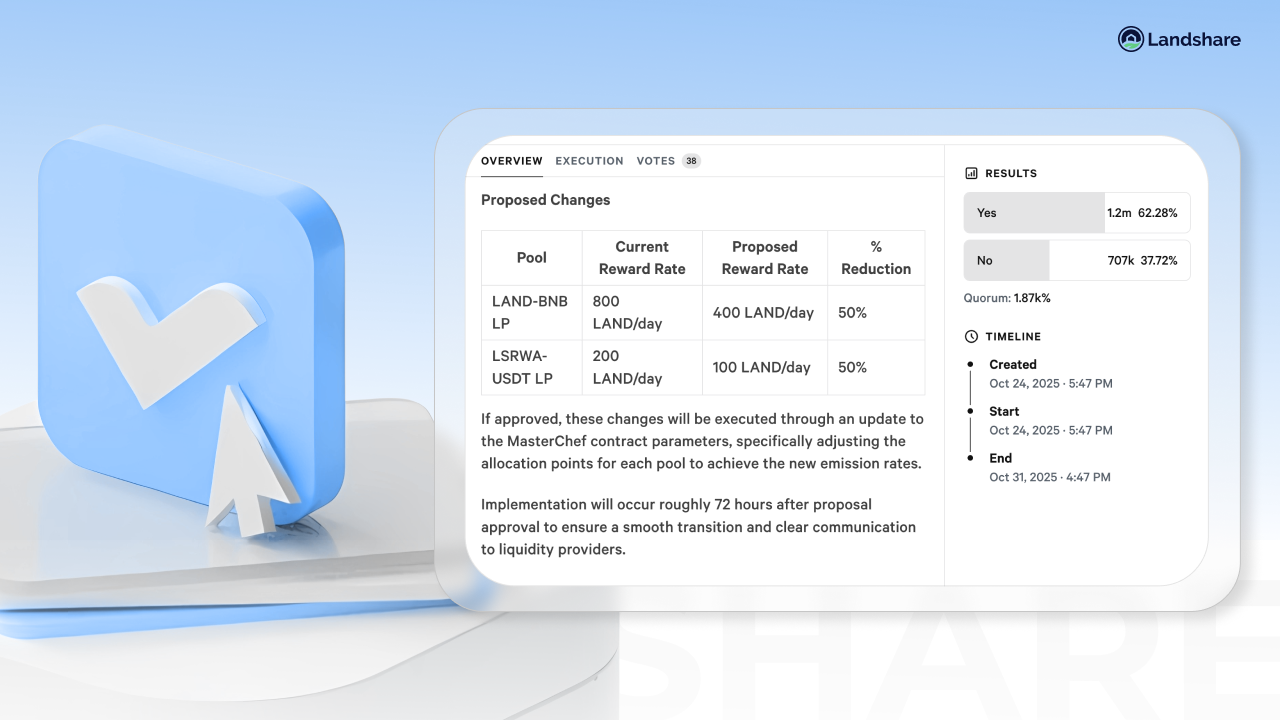
Tokenization Hub Breakdown
We released a comprehensive guide to the Landshare Tokenization Hub, explaining how property owners can now go beyond simple tokenization to access real investors, liquidity, and on-chain utility.
The Hub bridges traditional real estate with blockchain finance – creating a pathway for real-world assets to generate ongoing yield, transparency, and accessibility.

4.5M+ LAND Staked
October also marked another key milestone – over 4.5 million LAND tokens (nearly half of the total supply) are now staked in vaults. This incredible community achievement reflects growing confidence in Landshare’s long-term vision and token utility.
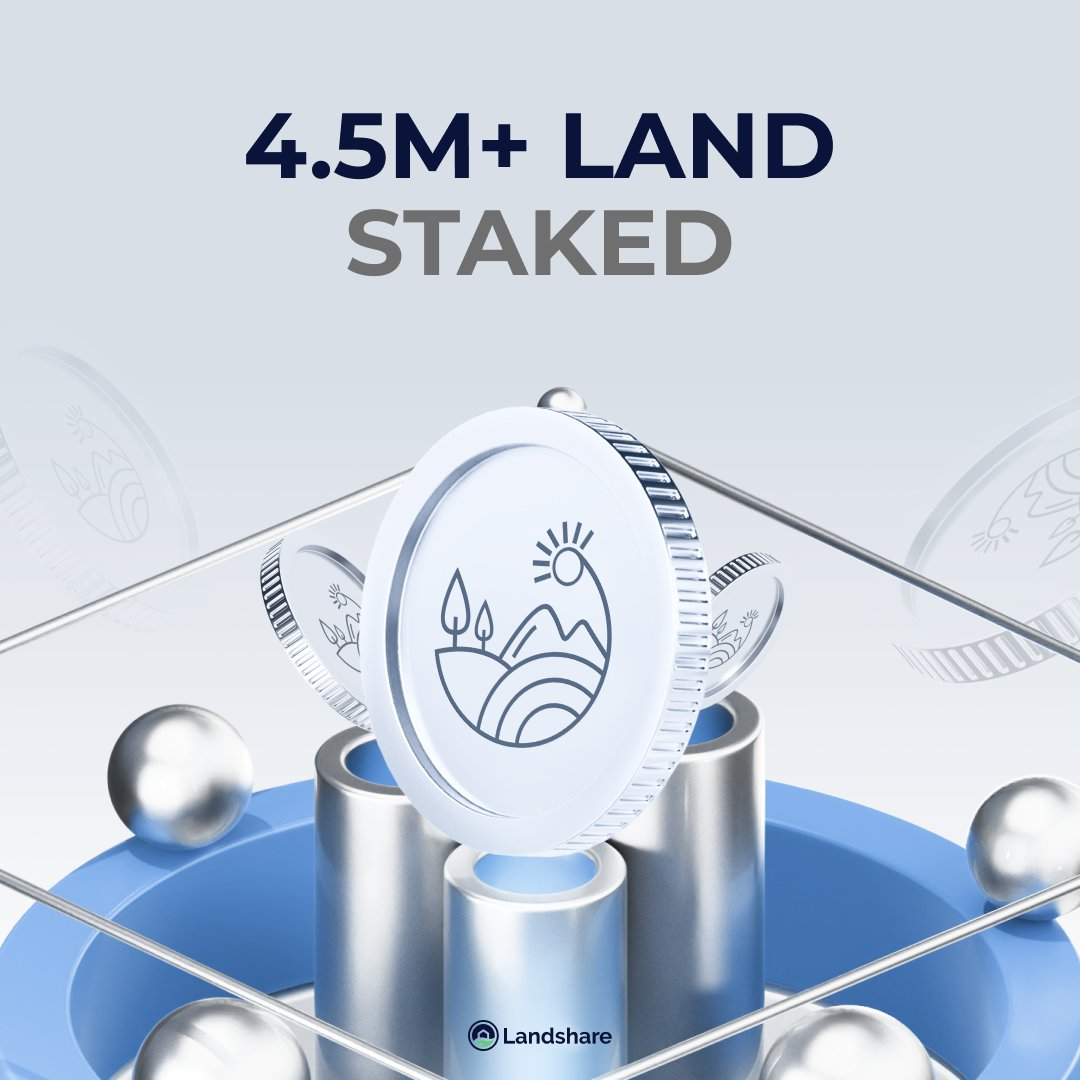
Community Townhall Incoming
We’re excited to announce our next Community Townhall, happening Thursday, November 6 at 12 PM CST or 6 PM CET on X Spaces!
Join Jordan (CEO), Travis (Co-Founder), and Ivan (CMO) as they discuss everything happening with Landshare v2, recent DAO proposals, and take your questions live.
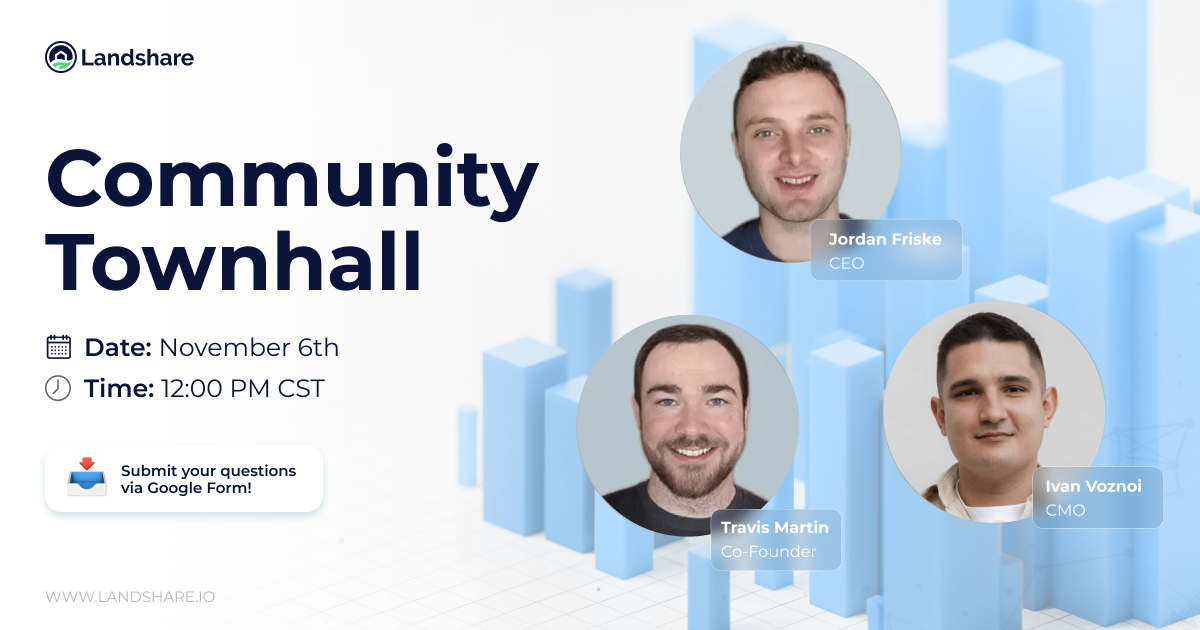
Looking Ahead
With Landshare v2 on the horizon, the foundation is set for a new phase of growth and adoption. In the coming weeks, we’ll be sharing more details on the RAV launch, the Points Campaign, and other major milestones driving our ecosystem forward.
Stay tuned – the future of real estate is being built on-chain, and we’re just getting started.
Tokenization Hub Breakdown
Landshare Team
Real estate tokenization has been a buzzword for years. Yet in practice, most projects have failed to move beyond press releases and empty promises. Too often, blockchain has been used as a veneer to package illiquid or low-quality assets, leaving investors with tokens that serve little purpose and property owners with no meaningful results.
Without investors, liquidity, or secondary markets, tokenization becomes little more than an on-chain spreadsheet — a digital record of ownership that no one can trade or invest in. For property owners, that means time and money spent “tokenizing” without achieving key goals: raising capital, expanding visibility, or unlocking value.
A Smarter Path Forward
For real estate tokenization to truly work, it needs to deliver tangible investment outcomes. After years of building and refining on-chain real estate products, Landshare has developed a model designed to do exactly that.
The Landshare Tokenization Hub transforms tokenization from a passive concept into an active investment process — connecting high-quality properties with real investors, liquidity pathways, and a live blockchain economy.
The Tokenization Hub Solution
Most platforms stop once a token is created. Landshare’s Tokenization Hub goes further , offering a complete pathway for property owners to bring their assets on-chain and immediately engage investors.
Each project is structured for success from day one, with:
- Customized tokenization models tailored to each property
- Transparent fundraising mechanics with defined soft and hard caps
- Built-in integration with the broader Landshare ecosystem
By connecting directly to Landshare’s existing network of investors and DeFi infrastructure, offerings can attract participation as soon as they launch. Once a fundraising goal is met, property tokens are deposited into the Landshare RWA Pool, linking them to ongoing liquidity, yield mechanisms, and secondary market exposure.
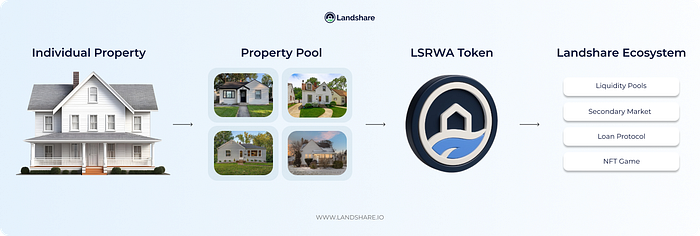
Why This Model Delivers Real Results
Where others leave property owners to manage marketing, compliance, and liquidity alone, the Tokenization Hub handles these as part of a unified process. This integration dramatically increases the likelihood of meeting fundraising goals and sustaining long-term engagement.
Integration with the Landshare RWA Token (LSRWA) is central to this model. Rather than isolated tokens with no market, each property becomes part of a shared, liquid environment that generates yield and investor participation. Individual assets can still be represented, extracted, or traded independently when needed.
For example, a multifamily property owner might tokenize 20% equity to raise $500,000 on-chain, connect the asset to the RWA Pool for ongoing yield, and maintain full transparency for investors — all within a compliant, accessible framework.
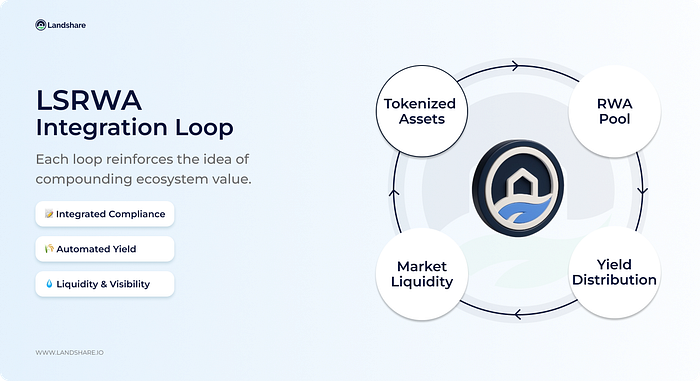
How It Works
- Tokenize the Property: Landshare collaborates with property owners to create a digital representation of equity, income rights, or hybrid participation.
- Launch the Offering: The property is listed on the Tokenization Hub with defined terms, caps, and transparent investor access.
- Fundraising & Validation: Investors participate directly on-chain. Once the soft cap is reached, funds are secured and the offering is finalized.
- Ecosystem Integration: Tokens are deposited into the Landshare RWA Pool, and investors receive LSRWA tokens representing pooled value and yield potential.
- Ongoing Value Creation: Property owners gain lasting benefits through liquidity, visibility, and investor engagement. As new assets are added to the pool, owners can rebalance between equity and cash, making real estate a more dynamic and liquid asset than ever before.

Built for Real-World Impact
The Landshare Tokenization Hub is more than a technical service — it’s a complete ecosystem designed to make real estate investment active, liquid, and accessible.
For property owners, it offers a streamlined way to raise capital and connect with global investors.
For investors, it provides exposure to yield-generating, on-chain assets backed by transparent real-world value.
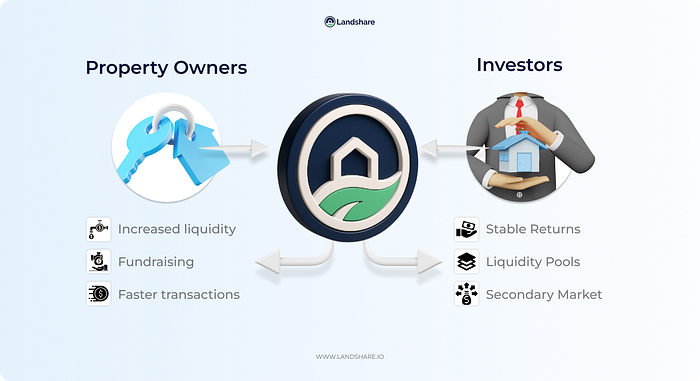
In an industry crowded with static tokens and overhyped promises, the Tokenization Hub delivers what tokenization was always meant to achieve — real outcomes, real liquidity, and real-world results.
🏡 About Landshare
Landshare is a tokenized real estate ecosystem that enables seamless investment in real-world assets on the blockchain. With Landshare, you can own a share of a real-world property simply by holding our RWA Tokens ($LSRWA). Our platform offers a secure, transparent, and efficient way to invest in real estate without traditional barriers.
- Website: landshare.io
- Twitter: @Landshareio
- Community: t.me/landshare
Plume Network's SEC Approval Means RWA Projects Are Closer to the $16T Market
Landshare Team
On October 6, Plume Network announced on its social media that it had been approved to be an SEC-registered transfer agent. This is a big milestone for the RWA industry, signaling that the traditional financial system is welcoming tokenized assets.
Transfer agents basically manage important back-end work and are the official record-keepers for securities issuers. So, essentially, they maintain shareholder registries, record ownership changes, issue certificates, and handle other corporate actions.
Plume’s approval means these critical functions can now be managed on-chain for tokenized securities. This is a pretty big deal, as it gives Plume and its users formal regulatory standing under U.S. law for on-chain securities.
Experts believe that this approval can boost the global RWA market, and top players like Landshare can benefit from it due to the increased regulatory clarity.
Why is the SEC’s Approval Important for Plume Network?
So, first, understand the roles of a registered transfer agent to get a better understanding of its importance.
In traditional finance, a transfer agent is usually a company or bank that tracks who owns a company’s securities and facilitates trades. They ensure every share transfer, stock split, or dividend payment is accurately recorded and reported. Now, let’s understand how this traditional role will work in the world of blockchain.
Post Link
By replicating these roles on-chain, Plume’s platform can securely log every token sale or dividend distribution in an immutable ledger, while also syncing with regulators. As Plume explains, its transfer-agent protocol will “link cap tables and reporting directly to SEC and DTCC systems”.
This means tokenized equity and debt on Plume can behave like traditional securities, but will be managed better with the help of blockchain technology.
Plume’s CEO believes that this regulation “exists to protect investors’ rights as shareholders,” and Plume’s on-chain solution is meant to simplify the processes under that framework.
Its Impact:
Experts believe that the registration will open up several doors for the RWA market because of the ‘trust factor’. Being registered means there are no risks as far as legality is concerned. When an industry or its top player receives a green flag from the government regulatory agencies, institutional capital follows.
BlackRock, Fidelity, JP Morgan, etc., are already looking to build blockchain-based products. This will further invite them to join the RWA growth story and possibly super-boost it.
Moreover, another important benefit is that tokenized securities can now flow through compliance obstacles. This means issuance times can be cut from months to weeks with the help of smart contracts. Similarly, on-chain dividends and ICOs can enjoy the same legal protections as Wall Street offerings.
What Does This Mean For The RWA Market?
Plume’s win comes at a time when analysts are already forecasting a massive growth in tokenized RWAs over the next decade. Institutions now value tokenization as a way to digitize everything from private credit to real estate. Also, the numbers are pretty optimistic as well.
A Boston Consulting Group report estimated the global asset-tokenization market could reach about $16.1 trillion by 2030. The industry has already grown by almost 380% in the past three years. To put things into perspective, today’s entire crypto market cap is smaller than those figures. Even some of the more conservative forecasts still show multi-trillion growth.
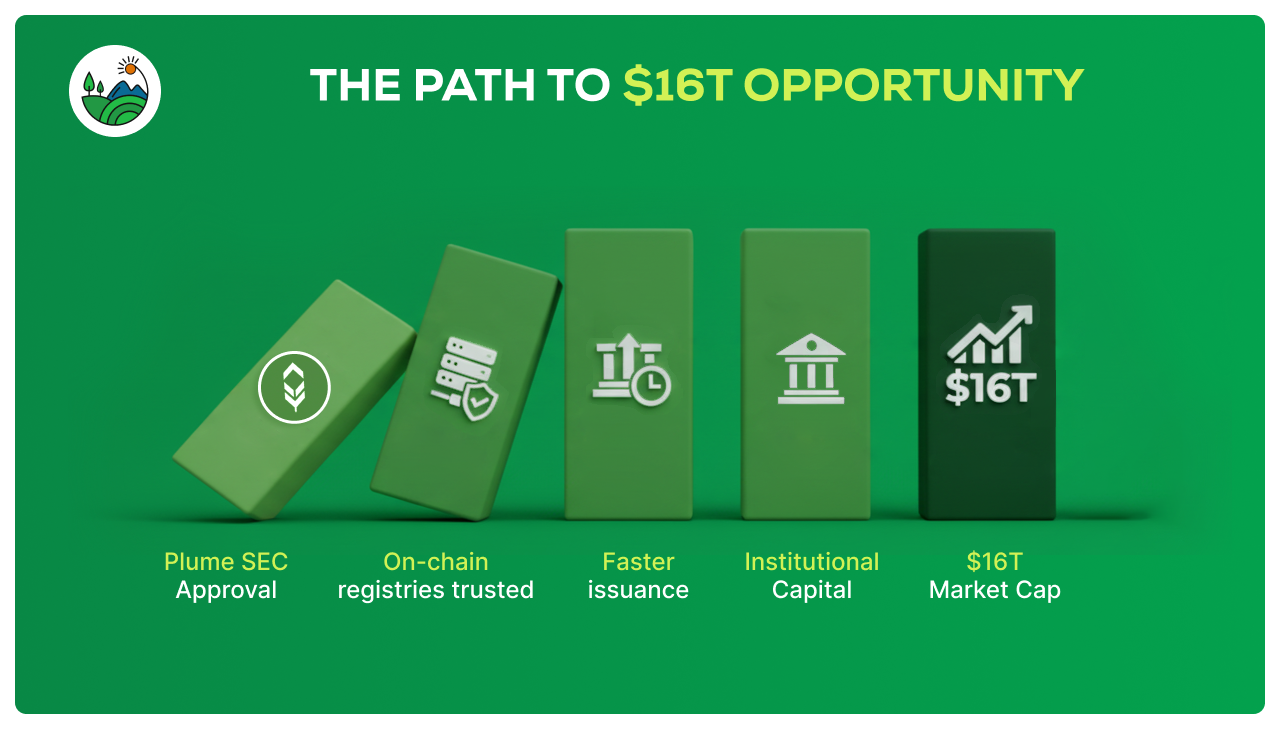
If these estimates can materialize in the days to come, RWA is well-positioned to be one of the largest markets in the world of modern finance.
Moreover, the external conditions are favoring this industry. Governments and regulators worldwide are creating proper frameworks. For instance, Asia-Pacific markets are running pilots for digital bonds and crafting standardized rules for security tokens.
These developments and the excitement of retail investors in this category build confidence that the $16T opportunity is actually very real.
How Will Landshare Benefit From This?
Landshare stands at the forefront of benefiting from this opportunity because of its early entry and real-world utility. This is very important as institutions seek new projects that have use cases that can help them capture a considerable market share.
Moreover, Landshare already operates as a compliant RWA platform. For instance, each Landshare RWA Token (LSRWA) is a security token representing fractional shares of a U.S. real estate portfolio, and buyers must pass KYC/AML checks.
The fact that regulators are now approving on-chain transfer agents shows the industry’s efforts are finally paying off. Here are some more factors that can help Landshare be one of the top RWA contenders:
1. Regulatory Credibility: Plume’s SEC status essentially means that tokenized securities can operate within established rules. Landshare’s approach aligns with these principles. So, investors can be assured that their projects sit within a legal framework designed to protect shareholders.
2. Investor Confidence: Every step toward clear regulation lifts confidence. The recently passed GENIUS Act, the SEC’s staff statements on liquid-staking, and the Trump administration’s overall outlook towards the crypto market have been fairly positive.
Similarly, Plume being approved as a SEC-registered blockchain transfer agent tells retail and institutional investors that projects like Landshare aren’t mere experiments. They’re rather a part of a regulated financial evolution.
Moreover, it means regulators see value in on-chain tokens, and that kind of signal helps legitimize the space Landshare operates in.
3. Landshare’s Own Progress: Landshare isn’t about hype. It is rather focused on delivering value from day one. The project has already sold four houses on the BNB chain. It is also providing consistent rental returns to the investors in its properties.
Moreover, the team remains focused on delivering stable, compliant returns from real estate growth.
Conclusion
So, now we know that the recent news was about more than just Plume Network being approved by the SEC to be a transfer agent. It rather has a much bigger impact on the RWA market as a whole.
While the industry continues to grow, for Landshare, it is the right time to innovate further and add more value to consumers’ lives.






